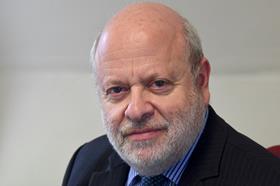It was timely that bars and law societies were officially involved for the first time in the COP 27 event just coming to an end in Egypt. That is because lawyers are caught up in climate change challenges as never before.

A number of bar organisations (the International Bar Association, American Bar Association, Ordem dos Advogados do Brasil and our own Law Society) held an event at COP27 on ‘The Role of Lawyers, Bars and Law Societies in the Climate Crisis’. If you want to know exactly how climate might be affecting lawyers, something too often doubted even by lawyers themselves, then read on.
Banking on a red wave in the recent US mid-term elections, a group of Republican senators recently wrote to over 50 US law firms to warn them about their ESG practices. The firms include those initially of UK origin, like Allen & Overy, Clifford Chance and Dentons.
ESG (environmental, social and governance) is a set of standards measuring a business's impact on society, the environment, and how transparent and accountable it is, widely used by many businesses, including law firms. However, it has now become part of the US political culture wars.
The opening paragraph of the letter to the law firms begins as it means to go on: ‘your firm has a duty to fully inform clients of the risks they incur by participating in climate cartels and other ill-advised ESG schemes’.
It then lays out its case:
‘The ESG movement attempts to weaponize corporations to reshape society in ways that Americans would never endorse at the ballot box. Of particular concern is the collusive effort to restrict the supply of coal, oil, and gas, which is driving up energy costs across the globe and empowering America’s adversaries abroad.’
The senators believe that this collusion amounts to ‘institutionalized antitrust violations being committed in the name of ESG’, and intend to refer the violations to the US competition body, the Federal Trade Commission, and the Department of Justice. They advised the law firms that they and their clients should take care to preserve relevant documents in anticipation of competition investigations.
Around the same time, another Republican senator wrote to 12 ESG ratings and analytics providers requesting that they keep documents related to the methodologies for their ESG ratings. This was a follow-up to an earlier letter to the same firms asking for clarification on their methodologies.
It so happened that the red wave did not materialise, and the senate remains in Democratic hands. But that is not the end of the story by any means.
First, the House of Representatives will have a slim Republican majority and the likely chair of a relevant committee, the House Financial Services Committee, has recently emphasised his opposition to the Securities and Exchange Commission’s proposed rule to require companies to disclose more climate-related information.
And in any case, there is continuing activity at US state level. For instance, 19 Republican attorney generals sent letters a few months back to Blackrock, the huge asset management and investment firm, which alleged that Blackrock was privileging its ‘climate agenda’ over its fiduciary duties. Louisiana, Utah and Missouri, have divested state funds from BlackRock for alleged anti-fossil fuel policies.
Another group of Republican attorney generals last month sent civil investigative demands to the 6 largest banks in the US to explore whether the banks’ ESG pledges have harmed the energy sector.
You can see the direction of travel. Law firms, too, are now in the cross-hairs, being seen as the gatekeepers, or so-called enablers, of their clients’ ESG actions. As in so many other areas, politicians are targeting them.
Anti-trust allegations are serious matters, and have real world consequences. An example of this is a startling announcement made earlier this month by Mark Carney, the former governor of the Bank of England and now UN Special Envoy for Climate and Finance.
He co-heads the Glasgow Financial Alliance for Net Zero (GFANZ), a global coalition of leading financial institutions committed to accelerating decarbonisation of the economy, and to providing tools and resources for the financial sector to implement net-zero commitments. He stated that members of GFANZ would be allowed to drop out of Race to Zero (a UN initiative which requires signatories to phase out fossil fuels) because of antitrust concerns.
Interestingly, it is thought that one of the reasons why the Democrats did so relatively well in the elections is because of their efforts to tackle climate change.
Nevertheless, Republican politicians, whether it served them well electorally or not, have managed to cast a chill over law firms’ advice on ESG.
In other words, as efforts to combat climate change grow, we can expect lawyers’ roles to face increasingly more serious challenges.
Jonathan Goldsmith is Law Society Council member for EU & International, chair of the Law Society’s Policy & Regulatory Affairs Committee and a member of its board. All views expressed are personal and are not made in his capacity as a Law Society Council member, nor on behalf of the Law Society































5 Readers' comments